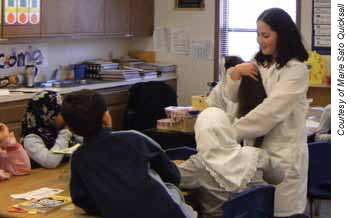Student group promotes multiculturalism at veterinary colleges
![]() SPECIAL ISSUE: DIVERSITY | Additional photos from this issue are available here. See a timeline charting milestones in diversity.
SPECIAL ISSUE: DIVERSITY | Additional photos from this issue are available here. See a timeline charting milestones in diversity.
Marie Sato Quicksall is a veterinary student at The Ohio State University who happens to be half Japanese.
As an undergraduate at Ohio State, Quicksall did not feel out of place. But she didn't see any minority students when she toured the veterinary college, twice.
Nevertheless, Quicksall did enter the Ohio State veterinary college. She soon decided to form a new chapter of Veterinary Students as One in Culture and Ethnicity. Now a third-year student, she serves as national president of VOICE.

The goal of the group, which includes minorities and nonminorities, is to promote multiculturalism at veterinary colleges through activities ranging from lecture series to taste fairs and dance classes. Members of VOICE also aim to increase the diversity and inclusivity of the veterinary profession.
"We like to do outreach activities in the community," Quicksall said. "We give presentations about veterinary medicine to underrepresented minority groups, mostly for schools and school groups."
VOICE started in 2001 at Cornell University College of Veterinary Medicine under another name, Veterinary Students for the Promotion of Socio-cultural Awareness. The group changed its name in 2004 and became a national organization in 2007.
Dr. Julio Lopez, a 2008 Cornell graduate, led the effort to take VOICE national when he was president of the original group at his college.
Moving from Los Angeles to Ithaca, N.Y., to attend veterinary college, Dr. Lopez found support among the members of VOICE.
"It helped me feel a little bit more in a familiar place, even though I was somewhere very distant from home," Dr. Lopez said. "It was a very welcoming environment. We had a lot of different activities and developed some good friendships."
After becoming president of VOICE at Cornell, Dr. Lopez obtained funding from Pfizer Animal Health to assist with transforming the group into a national organization. The national launch was at the 2007 Student AVMA Educational Symposium.
Dr. Lopez said the launch was successful, and Pfizer has provided additional funding for VOICE. Currently, 12 veterinary colleges have active chapters. The hope is that every veterinary college will form a chapter, even if the student body has few underrepresented minorities. Dr. Lopez thinks the group's inclusion of nonminorities as well as minorities has helped VOICE to grow.
Jai Sweet, PhD, longtime adviser to VOICE at Cornell, said open membership is an important facet of the group.
"You can't have these discussions in isolation," said Dr. Sweet, director of student services and multicultural affairs for Cornell's veterinary college. "You can't promote the activities you need for diversity by preaching to the choir. We need everyone to understand this is everyone's issue."
Dr. Sweet said VOICE members promote diversity and multiculturalism because they want the veterinary profession to reflect the country's diverse cultural landscape and want practitioners to appreciate the perspectives of clients from many backgrounds.
Perhaps as important, members of VOICE are trying to build a supportive campus climate for minority students.
Additional information about VOICE is available at www.vetvoice.org.